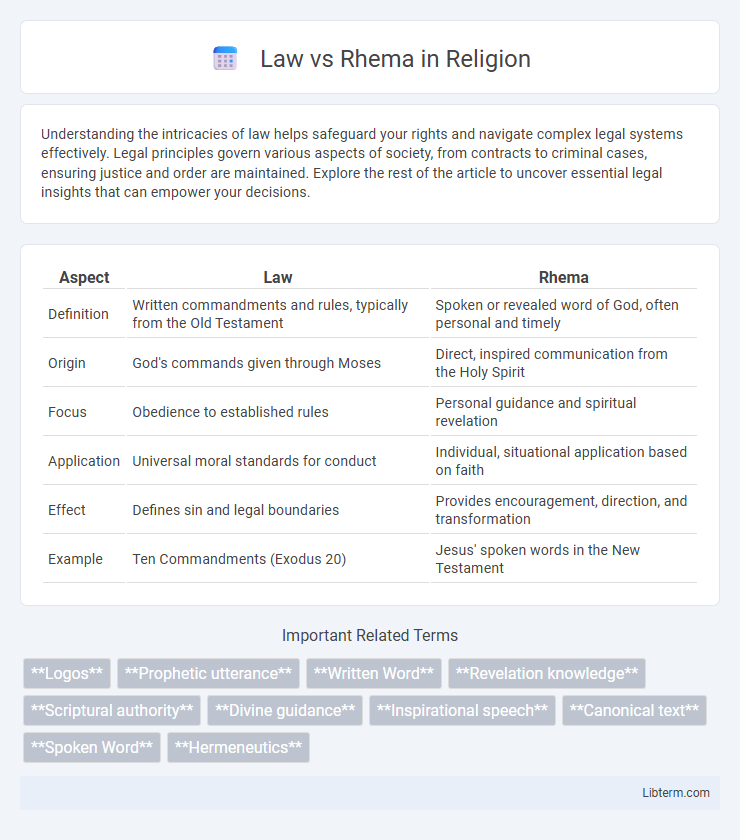Understanding the intricacies of law helps safeguard your rights and navigate complex legal systems effectively. Legal principles govern various aspects of society, from contracts to criminal cases, ensuring justice and order are maintained. Explore the rest of the article to uncover essential legal insights that can empower your decisions.
Table of Comparison
| Aspect | Law | Rhema |
|---|---|---|
| Definition | Written commandments and rules, typically from the Old Testament | Spoken or revealed word of God, often personal and timely |
| Origin | God's commands given through Moses | Direct, inspired communication from the Holy Spirit |
| Focus | Obedience to established rules | Personal guidance and spiritual revelation |
| Application | Universal moral standards for conduct | Individual, situational application based on faith |
| Effect | Defines sin and legal boundaries | Provides encouragement, direction, and transformation |
| Example | Ten Commandments (Exodus 20) | Jesus' spoken words in the New Testament |
Understanding the Concept of Law in Theology
The concept of Law in theology often refers to divine commandments and moral principles revealed in sacred texts, serving as a guideline for ethical conduct and spiritual discipline. Law is distinct from Rhema, which signifies the specific, timely word or utterance from God addressing individual situations and offering personal guidance. Understanding Law involves recognizing its role as a universal, unchanging standard contrasted with Rhema's dynamic and situational nature.
Defining Rhema: The Spoken Word of God
Rhema refers to the specific, spoken word of God that conveys a direct and personal message to an individual, distinguishing it from the written Law, which represents the general commandments and statutes found in scripture. This spoken word acts as a dynamic, immediate revelation that guides believers in particular situations, often providing clarity and empowerment beyond the established legal framework of the Law. Emphasizing Rhema underscores the importance of divine communication that brings life and transformation, activating faith in ways that the traditional Law alone may not achieve.
Law vs Rhema: Key Differences in Biblical Context
Law in the biblical context typically refers to the written commandments and statutes given through Moses, emphasizing obedience and external standards. Rhema, however, denotes the spoken or revealed word of God, highlighting a personal, dynamic communication tailored to individual circumstances. The key difference lies in Law's fixed, universal principles versus Rhema's active, situational guidance from the Holy Spirit.
Scriptural Foundations: Law in the Old and New Testament
The concept of Law in Scripture is primarily grounded in the Old Testament, where the Mosaic Law, including the Ten Commandments, serves as a covenantal framework guiding Israelite conduct and worship. In the New Testament, Jesus reinterprets the Law, emphasizing its fulfillment through grace and truth, as seen in passages such as Matthew 5:17 and Romans 6:14. This shift highlights the contrast between the Old Testament Law as a set of external regulations and the New Testament Rhema, or living word, as a dynamic, spirit-led guide for believers.
Rhema in the Bible: Examples and Applications
Rhema in the Bible refers to the specific, living word or message from God delivered directly to an individual, distinct from the general law or written scriptures (logos). Examples of Rhema include God's spoken words to prophets like Jeremiah or the personal revelation Jesus gave to His disciples, providing guidance or encouragement tailored to their circumstances. Applications of Rhema involve discerning and applying these timely divine messages in daily life for spiritual growth, decision-making, and strengthening faith through personalized divine insight.
The Relationship Between Law and Rhema
The relationship between Law and Rhema is central to understanding divine communication and human obedience in biblical theology. Law represents the written, eternal commandments given to guide moral behavior, while Rhema refers to the spoken or revealed word that brings specific, immediate insight or guidance from God. Together, Law provides the foundational principles, and Rhema offers dynamic, personalized application, fostering a deeper spiritual connection and practical obedience.
Impacts on Christian Life: Following the Law vs Embracing Rhema
The Law in Christian life often emphasizes adherence to commandments and external rules, potentially leading to legalism and spiritual burnout. Rhema, understood as the Spirit-inspired Word or personal revelation, fosters a dynamic relationship with God, encouraging believers to respond to His guidance in everyday situations. Embracing Rhema impacts faith by promoting grace, inner transformation, and a more intimate, empowered walk with Christ beyond mere rule-following.
Theological Debates Surrounding Law and Rhema
Theological debates surrounding Law and Rhema center on their distinct roles in scriptural interpretation and Christian practice, with Law often representing the established commandments or covenant, and Rhema referring to the spoken or revealed word believed to have immediate spiritual relevance. Scholars argue that the Law provides a fixed moral framework, whereas Rhema embodies dynamic, situational guidance from the Holy Spirit. This discourse influences doctrines on salvation, sanctification, and the believer's daily walk, highlighting the tension between legalism and experiential faith.
Practical Implications: Discernment and Daily Faith
Law represents the established moral code and commands guiding ethical conduct, while Rhema refers to the specific, timely word or revelation from God for individual situations. Practical implications of discerning between Law and Rhema involve exercising spiritual sensitivity to apply universal principles appropriately in daily decisions and faith practices. This discernment fosters dynamic, responsive faith that adapts to context while upholding foundational truths.
Choosing Between Law and Rhema: A Balanced Perspective
Choosing between Law and Rhema involves understanding that the Law represents established commandments and universal principles, while Rhema refers to the spoken or revealed word tailored to specific situations. A balanced perspective emphasizes applying the Law's consistent moral framework alongside Rhema's timely, personal guidance to navigate complex decisions effectively. Integrating both concepts fosters spiritual growth by respecting foundational truths and allowing flexibility in individual experiences.
Law Infographic

 libterm.com
libterm.com